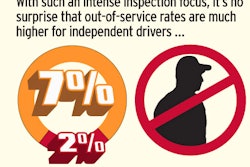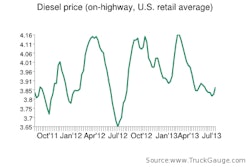
One day last month I found myself staring at a cash register screen at a Walgreens checkout counter, carefully auditing the prices of items as they rang up to ensure that I got the advertised deep discount on pistachios. I was about to complain when the register applied the discount only after all items had been totaled.
I didn’t give this experience a second thought — at least not until the next day, when news broke that the FBI was investigating allegations that Pilot Flying J had over several years withheld millions of dollars in monthly diesel fuel rebates that customers had been promised. It occurred to me that those customers apparently failed to pay as much attention to transactions of thousands of dollars as I had in ensuring that I had saved $3 on a bag of pistachios.
According to an FBI special agent’s affidavit that was used to obtain a search warrant for Pilot Flying J headquarters, the truckstop chain had targeted customers – typically smaller fleets – that were “deemed to be too unsophisticated” to discover that they were being shortchanged.
Regardless of how small your business is, there’s no excuse for inadequate internal controls or for failing to understand the contracts you sign. But working against this seemingly obvious advice is the notion that trucking literally is built on trust. Consider, for example, that many trucking companies routinely provide services without any expectation of payment for 30, 45 or maybe even 60 days. Ever try to book a flight by telling the airline that you will pay for the fare a month after you return home?
Trucking may not be unique in the degree to which it operates on the basis of trust, but it’s certainly unusual. Perhaps this culture of trust sets carriers up for abuse. For example, a California broker last year was sentenced to more than 10 years in prison and ordered to pay more than $440,000 in restitution for brokering loads to carriers but refusing to pay them.
More common than fraud committed by business partners may be theft and embezzlement by employees. Consider these fairly recent examples:
- A Florida man was arrested last June for stealing $160,000 from a trucking company by issuing fake purchase orders and writing checks to friends and family members.
- A South Carolina woman was charged last July with stealing nearly $300,000 from a large trucking company over more than four years by forging invoices and submitting them for expense reimbursement.
- A New Jersey man pled guilty in 2010 to stealing about $630,000 from a trucking company by issuing company checks that were deposited into the bank accounts of various towing and repair companies, which, through co-conspirators at those companies, had invoiced the carrier fraudulently for services never performed.
While technology helps, often adequate controls simply come down to taking the time to review important transactions and setting up policies and procedures that make fraud more difficult.
Simple steps to thwart employee fraud:
The following tips for ensuring adequate internal controls are from CCJ’s Commercial Carrier University:
- Conduct full background checks on anyone who has access to bank accounts, corporate credit cards or cash.
- Require employees to take vacations and have other employees perform the duties of those employees in their absence.
- Ensure that any incoming funds are logged first by someone other than the person responsible for accounting for and depositing them.
- Don’t let the same person authorize new employees and payroll expenditures or authorize new vendors and payments to vendors.
- Don’t give any employee sole discretion over all transactions.
- Randomly verify drivers’ fuel consumption, and audit their use of fuel cards.











